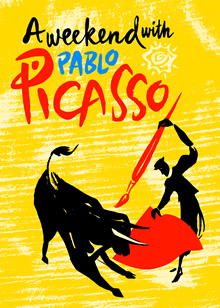Picasso may have been arrogant and difficult. I’ve had coworkers like that, but they weren’t inspirational. Picasso was—and still is. The play takes us through an imaginary weekend of the artist’s life as he paints, reflects, philosophizes, and paints some more. He does this in English, Spanish, and occasionally French while dancing, creating, and even dreaming.
During the play, I probably annoyed my neighbors. I was busy writing down key phrases such as “Inspiration doesn’t exist, or if it does, it must find you working.” How true. It might be nice to sit around waiting for the “right” moment to write, but most artists wouldn’t get much done that way. Neither would most authors.
Picasso also explained his most important raison d’être: “I want you to discover something [through art] you would have never discovered without me.” People might like his art or not. That’s not the point. Instead we should consider what it makes us feel or think. We should consider how we respond or how we resist.
What we should never resist is creativity itself. I’ve always thought of Picasso as strictly an artist, but for a couple of years, he dedicated himself to poetry. (Since he was going through a costly divorce, he joked that he had no incentive to paint anyway.) He took on this new challenge when he was the same age I am now. Does that mean I should start painting?
Here’s another gem: “If your painting does not go wrong, it will never be good.” Honestly, it’s like writing. (Remember Peter Elbow’s wonderful proclamation: “I have to start by putting all the wrong words in all the wrong sentences…..”)
I might not have liked Picasso as a man (almost certainly not!), but as a writer, I’m inspired. As he says, “Action is the foundation to all success.” Do I live each day in abandon to my art? At this point I do not. This is a point worth pondering.
At the beginning of the play Picasso explains that every child is uniquely special. We all have our own passions and gifts. What counts is how we use them. As he explains, “Your work must be the ultimate seduction, the ultimate pleasure.” Indeed, if I haven’t written on a single day, I feel that I missed out, that I didn’t do enough to make progress, that I wasted my time. Sometimes such pangs of guilt are painful, but they’re also motivational. I have books to write. This takes time. I need to keep moving.
Picasso lived his life on his own terms, but he had a higher calling, that of the artist. The spirit of creation grabbed him and never let go. His vast output of work has inspired and sometimes horrified legions of art students and museum goers. As Picasso says, unapologetically, “I lived my life in broad daylight.” Instead I would focus on the first two words. Pablo was no saint, but he really, really lived. It’s no accident that my favorite Picasso painting, created in Antibes, is “Joie de vivre” or “Joy of Life.”
Long live the artist in all of us.
A Weekend with Picasso is playing in Tucson through Sunday at the Temple of Art and Music; then it moves to Phoenix. Check out details at http://www.arizonatheatre.org/our-shows/a-weekend-with-pablo-picasso/ Two performances were even offered in Spanish, giving special flair to the Spaniard's speech; two more will be offered in Phoenix.
For a list of my novels, please see http://www.drransdellnovels.com. I haven’t written about any painters—yet.


 RSS Feed
RSS Feed